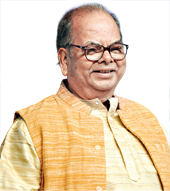
It is every good writer’s duty to complete his work. But by its very definition, an autobiography can never be complete. So, knowingly why should I start on something that will be incomplete?
Sankar
If you've sat down for a coffee with Sankar, an engaging chat comes with the territory, sprinkled with nuggets like Swami Vivekananda's love for biryani or the luchi as GPS!
A few days short of his 81st birthday on December 7, we found the famous writer of Bengali novels, biographies, travelogues, food essays and much more in his office at Victoria House. Here of course, the creator of Sata Bose and Chowringhee is Manisankar Mukherjee, chief adviser (corporate relations), CESC.
He says he enjoys having two lives. 'When I get tired of being a manager, I go home and refresh myself by becoming a writer. And when I exhaust myself over a weekend of writing, I become a manager again,' Sankar smiled.
He is currently writing yet another volume on his biggest inspiration, Swami Vivekananda. Titled Ahare Onahare Maharaja Bibekanando, this book will be on what Vivekananda thought about food and diet at different times in his life. 'Cooks in our country are called maharaj, thus the title of this book. Vivekananda may have been a champion of Vedanta philosophy but he was no less a champion of biryani! He was keen to take biryani to the West. And he loved to cook. He always carried mustard oil, turmeric, dal etc and wherever he got an opportunity, he sat down to cook. He was notorious for putting too much chilli in his dishes,' chuckled Sankar.
'He used to enjoy his food at one point, at other times he has gone without food for long stretches too. He used to dwell at length on matters of food, like the future of kochuri-singara.... He used to love kochuri but later he became critical of it, saying that items like kochuri and jilipi were not good for health.'
From kochuri, we moved on to its cousin - luchi.
'At one time, the size of luchi could tell you how far you were from Calcutta. In Malda, the luchi was made the size of a plate. It progressively shrank in size as one moved towards Calcutta. By the time you got to Thakurbari, it became taka luchi - coin-sized luchi. But Rabindranath and other family members didn't eat the whole luchi, just the phulko (the thin upper layer),' he said.
Bengalis, he rued, have become dispassionate about their own cuisine. But suddenly he perked up. 'Do you know why the Chinese make such good cooks, compared to other races? Because China was the only civilised country in the world where bad cooking was a ground for divorce,' he laughed.
Another book he has started work on is on 'the much-misunderstood' Bidhan Chandra Roy. He finds it interesting because Roy was his contemporary. But what about writing on someone from present times? 'There are newspapers for that. I don't think I have the inclination, ability or foresight to comment on current affairs or write about present-day personalities. I am an outsider in Calcutta. I came to Howrah in 1937 aged about four years from Bongaon. It is outsiders who enrich a city. The rich of this city and its poor are non-Bengalis, outsiders. There is only one Bengali city in the world now - Dhaka. We deliberately deny Dhaka this distinction. And it's the only city in the world where a Bengali author feels like a hero. We may be read in Calcutta but only in Dhaka are we treated like heroes.'
Sankar feels not enough is being done to ensure the survival of Bengali, on either side of the border. 'There are 25 crore Bengalis all over the world. Can we not nurture 25 writers who will keep the language and literature alive? Even if 15 of them fail, 10 will flourish and Bengali will thrive for another generation at least.'
A third project on the cards is his reflections on life. He's not too keen on an autobiography, though. 'It is every good writer's duty to complete his work. But by its very definition, an autobiography can never be complete. So, knowingly why should I start on something that will be incomplete?'
His books have been translated into languages as diverse as English, Italian, Spanish and Chinese and he speaks fondly of his reception in London because of Chowringhee. But he sounds a word of caution. 'Sometimes praise goes to an author's head and they are tempted to speak beyond their domain. No one asks Bhim Nag what's the social significance of his sandesh, no one asks him for his comment on contemporary socio-political issues... then why should a writer have to face these questions?' he wondered.
But is a sandesh and a novel the same? ' Ek-i toh. Why, is Mahatma Nakur any less than Sarat Chandra?'
We end our chat on that sweet yet novel note.










